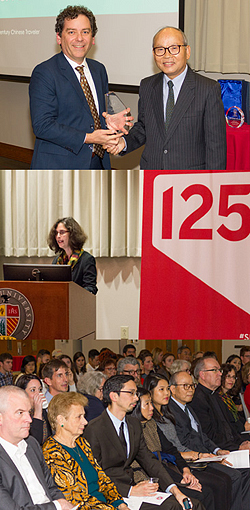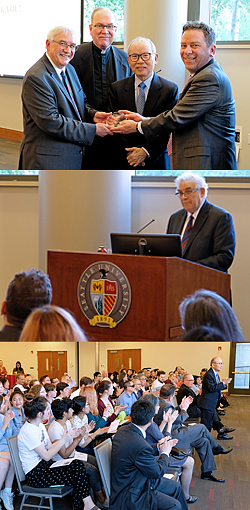
Peter L. Lee Endowed Lectureship
East Asia in a Larger World: Cross-Cultural Contacts in the Globalizing Middle Ages
Hyunhee Park, Ph.D, Department of History, John Jay College of Criminal Justice and the CUNY Graduate Center, the City University of New York
May 2, 4 p.m. reception, 4:30 – 6 p.m. lecture
Oberto Commons - (SINE 200)
Presented by Seattle University College of Arts and Sciences and Asian Studies.
-
About Professor Hyunhee Park
-
Hyunhee Park serves as a Professor of History at John Jay College of Criminal Justice and the Graduate Center of the City University of New York. Born and raised in South Korea, she completed her BA in Asian history at Seoul National University in 1997. She then pursued her MA in East Asian Studies at the Hebrew University of Jerusalem and was awarded her degree in 2003. Dr. Park earned her Ph.D. in History from Yale University in 2008, where she focused her dissertation on the historical cross-cultural contacts between East Asia and the Islamic World. Her academic specialty is in Sino-Islamic interactions during the Mongol Empire and broader aspects of global history.
-
About the Lecture
-
East Asia in a Larger World: Cross-Cultural Contacts in the Globalizing Middle Ages
This lecture explores the dynamic cross-cultural interactions during the Middle Ages, highlighting East Asia’s role in the early stages of globalization. Dr. Park's research on the significant impact of technological and knowledge transfers will be central to this discussion. This includes the increase in geographic understanding between China and the Islamic world from around 750 to 1500, and the advent of soju through the distillation technology exchange in Eurasia, as explored in my works Mapping the Chinese and Islamic Worlds: Cross-Cultural Exchange in Pre-Modern Asia and Soju: A Global History. The lecture will emphasize the Silk Road’s role in facilitating these exchanges, particularly during the Mongol era, and reflect on how these interactions shaped East Asia’s scientific and cultural landscape. The aim is to offer insights into the complexity and significance of these historical cross-cultural contacts, demonstrating their lasting influence on global history and their relevance to contemporary global dynamics.
"Heavenly Learning": Jesuit Science in Imperial China
Florence C. Hsia, Professor of History of Science, University of Wisconsin-Madison delivers the 2023 Peter L. Lee Endowed Lecture in East Asian Culture and Civilization
May 8, 4 p.m. reception, 4:30 – 6 p.m. lecture
Casey Commons - (Casey 530)
Presented by Seattle University College of Arts and Sciences and Asian Studies.
-
About Professor Florence C. Hsia
-
Florence Hsia earned a B.A. in East Asian Studies at Princeton University and a PhD in History at the University of Chicago. She is now Professor of History of Science at the University of Wisconsin-Madison, where she is also currently serving as Associate Vice Chancellor for Research in Arts & Humanities and as Associate Dean in the Graduate School. She is the author of Sojourners in a strange land: Jesuits and their scientific missions in late imperial China (Chicago, 2009), and has focused on the history of Jesuit science in the context of the Society of Jesus’ global missions in the early modern period. Current areas of interest include data practices in astronomy and indexing methods for Chinese characters.
-
“Heavenly Learning”: Jesuit Science in Imperial China
-
From its beginnings in the late sixteenth century, the Jesuit episode in late imperial China framed a meeting of distinct scientific traditions, from concepts of earth and sky to modes of reckoning time and space. The encounter challenged members of the Society of Jesus to rethink how to best advance missions both religious and scientific, and to address how pursuing these intertwined goals might shape their own identities. This talk explores the long history of Jesuit scientific work in the Celestial Empire in order to better understand what such efforts meant for the Jesuits’ various audiences, as well as for themselves.
Strong Capacities, Stable Borders: State Formation through Emulation in East Asia
Chin-Hao Huang, Associate Professor of Political Science, Yale-NUS College delivers the 2022 Peter L. Lee Endowed Lecture in East Asian Culture and Civilization
November 15, 4 p.m. reception, 4:30 – 6 p.m. lecture
Harding 142, 1215 E. Columbia St., Seattle
Presented by Seattle University College of Arts and Sciences and Asian Studies.
-
About Professor Chin-Hao Huang
-
Chin-Hao Huang is associate professor of political science at Yale-NUS College. His research and teaching focus on Chinese foreign policy, the international relations of East Asia, and international security. He is the recipient of the Lee Kong Chian National University of Singapore-Stanford University Distinguished Fellowship on Contemporary Southeast Asia (2018-2019) and the American Political Science Association’s Foreign Policy Section Best Paper Award (2014). Huang’s latest research has been published in such disciplinary and field-relevant journals as International Organization; Cambridge Review of International Affairs; Foreign Policy Analysis; The China Quarterly; and Asian Survey, among others. He is the author or co-author of three books, including his latest manuscript, “Power and Restraint in China’s Rise” (Columbia University Press, 2022).
-
Strong Capacities, Stable Borders: State Formation through Emulation in E. Asia
-
Featuring a presentation by Chin-Hao Huang about his recently published book with David Kang, “State Formation through Emulation: The East Asian Model” (Cambridge University Press, 2022). Neither war nor preparations for war were the cause or effect of state formation in historical East Asia. Instead, emulation of China—the hegemon with a civilizational influence—drove the rapid formation of centralized, bureaucratically administered, territorial governments in Korea, Japan, and Vietnam, all of which occurred a thousand years earlier than Europe. Furthermore, East Asian countries engaged in state-building not to spur conflict or to suppress revolt. In fact, war was relatively rare and there was no balance of power system with regular existential threats—the longevity of the East Asian dynasties is evidence of both the peacefulness of their neighborhood and their internal stability. Huang and Kang challenge the assumption that the European experience with war and state-making was universal. More importantly, they broaden the scope of state formation in East Asia beyond the study of China itself and show how countries in the region interacted and learned from each other and China to develop strong capacities and stable borders.
Thanks to a generous contribution by Dr. Peter Lai Sun Lee ’64, Seattle University established the Peter L. Lee Endowed Lectureship in East Asian Culture and Civilization in April 2015. Housed in the College of Arts and Sciences and managed by the director of Asian Studies, the lectureship brings to campus prominent experts to explore the impact of East Asian thought and tradition on contemporary global issues.
“The Peter L. Lee Endowed Lectureship is designed to be interdisciplinary,” said Arts and Sciences Dean David Powers. “It will allow us to engage our students with sociohistorical context and pressing issues related to East Asian studies, modern languages, international business, comparative religion, and many other areas.”
Dr. Lee, who majored in chemistry, was one of the earliest international students to come to Seattle University from Hong Kong. Early in his career, he served as the first President of Coca Cola China. Subsequently, he led the Asian operations for several multinational companies including Mead Coated Board (then part of Mead Corporation) and Chesapeake Corporation. His most recent venture is Rondabosh International Ltd., a company he founded upon retiring from Chesapeake in 2008.
Dr. Lee received his PhD in chemistry from Michigan State University, did postdoctoral research at New York University, and studied with the great China scholar Joseph Needham at Cambridge University. He has had a longstanding association with the East Asian History of Science Foundation in Hong Kong and currently serves as its chairman. Throughout his academic, corporate, and nonprofit leadership involvement, Dr. Lee has worked tirelessly to build bridges of understanding between China and the West.
Past Lectures

The inaugural Peter L. Lee Endowed Lecture in East Asian Culture and Civilization, featuring Professor Tobie Meyer-Fong, of Johns Hopkins University, with her talk entitled: “World of Pain and Wonder: Horizons of a 19th Century Chinese Traveler.”

The 2nd annual Peter L. Lee Endowed Lecture in East Asian Culture and Civilization, featuring Professor Robin Yates, of McGill University, with his talk entitled: “Chinese Science, Medicine, and Technology: Some recent discoveries and new trends in the field.”